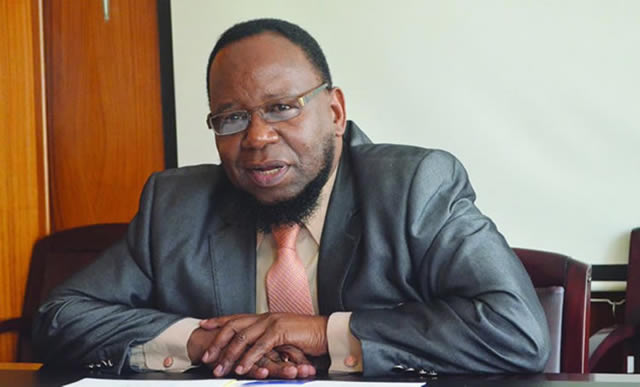Zimbabwe’s new curriculum: Rumours outpacing rumours


Minister Dokora
David Mungoshi Shelling The Nuts
In two of my preceding articles I took a deliberate dig at teachers. As they say, there is no smoke without fire and as we say in Zimbabwe, avhunduka chati kwatara ane katurike (the one startled by a sudden noise has a skeleton in the cupboard), so let the searching continue.
Conversely, if, as a teacher, none of the malpractices cited touch you, the bones that we cast will yield the mhururu celebration character for you.
This week I choose to be a little more empathic towards the poor besieged teachers of our beloved country. Change like a revolution is always disruptive at the beginning but evens out as the contradictions resolve themselves.
We have for some time now been experiencing what economists call diminishing returns. In the last few years our educational outputs have tended, by and large, to be a mismatch with our inputs.
The question is whether or not we have reached saturation point in terms of time, effort, resources and skills. Is it perhaps time to make that change? Our educational think tank says it is and so it must be. I say this advisedly rather than fatalistically. They are, after all, the guardians and guides of our school system.
NgesiNdebele they say, intaba ezikude zingumasithela. An apt and pithy saying concerning how distant mountains always obscure our sight. Beyond the mountains there usually lies a sight so beautiful as to be the stuff that dreams are made of, but as things turn out the obstacles may need greater resolve to shift. Nevertheless, we live to see that kaleidoscopic wonder take shape.
The Honourable Minister of Primary and Secondary Education, Dr Lazarus Dokora has talked himself almost hoarse on the issue of a paradigm shift and its realisation through the onset of a new curriculum for our schools and, as might be expected, this has caused quite a bit of consternation in some quarters.
The reasons for this are many and varied. They range from dogmatic defences of comfort zones to hard cynicism and scepticism, from missionary-like zeal to detached academic disputation, and from downright condemnation to enthusiastic acceptance.
Whatever the case might be, in all scenarios there are certain insistent prerequisites. And who better to enunciate these than the practitioners themselves — the teachers!
Those of my contacts in the primary school system that are pioneering the shift tell me they are moaning and groaning under a new heavy load, and that the “hurried” implementation of the new curriculum is choking and stifling an otherwise noble idea.
They say they find it rather ironic that while they are expected to teach listening skills no-one seems to be listening to them. MaGumede (not her real name), a middle grade teacher at a school in one of the new high density suburbs of Bulawayo, says many teachers are thinking that early retirement might save them from premature coronary thrombosis.
Their hearts are straining under the sheer load of heavy expectations. She and others like her have on average a class of 50 or more children and each day sees them marking at least six piles of exercise books and recording the scores against each child’s name.
Six different exercises from six different areas each day for each of the 50 children means that the teacher has to make 300 entries at the end of each day. At the end of the week that comes to a staggering 1 500 entries!
Add to that the week’s conceptual tests and you get a drowning.
As if that were not enough, come Monday morning the headmaster wants to see all the records of marks done and up to date. There’s also a plethora of other things, says MaGumede. In addition, each day the teacher has to make or find learning aids for the next day.
If you think that there can’t be more, you are mistaken. Every two weeks’ cumulative tests must be administered across the curriculum and recorded. All this is prescribed from above.
The time table even tells a teacher when to do reading comprehension each week or when to do cyclic reading: an amazing case of the prescription of methodology and activities. The teacher is willy-nilly relegated to the position of a mere conveyor. This is what MaGumede says is going on, the turning of teachers into compliant automatons.
Reader, you are forgiven if you are wondering what in the name of everything that is sacred and essential is going on in our schools. The buzz words are ‘continuous assessment’, a new but old fad that has recently hit our schools with the force of Hurricane Katrina.
Don’t get me wrong. I am all for it, but perhaps the teachers are right in saying that they are sinking under the flood of expectations. It’s a war out there when 17 standards control people descend upon a school in one day to do a total inspection and it all sounds so mechanical and predictable.
Another teacher of long standing, Mrs. Nyaya (not her real name) wonders why the authorities don’t see what everybody else can see.
Her view is that there is a need to change the curriculum in primary teacher education colleges so that more specialist teachers can be trained to cater for physical education, art education, music, Home Economics, Food and nutrition, Music and Agriculture. This would reduce the load for teachers without compromising quality.
Mrs Nyaya also complains about some of the prescriptions. A teacher is expected to be presentable at all times but does not always have the necessary facilities on the premises to make this possible.
She says, “You come to class smart and well dressed. Then you change into a track suit for the PE lesson where you run around, sweat and get dusty. After the PE you change back into your formal wear. What about the sweat and so on? Where do you freshen up?
“Later there can be an Agriculture lesson and all that goes with it. At the end of the day you are very close to being a nervous wreck and you suffer this anxiety on a daily basis.”
In these circumstances some will say that teaching is not for the faint-hearted.
Indications on the ground suggest that a buy-in to Dr Dokora’s vision is not yet ubiquitous and that is despite what the Minister says about education personnel. Says Dr Dokora in The Sunday Mail of September 11, 2016, “Our education system has provided today’s generation with knowledge, skills and a hybrid of attitudes that have driven the country’s growth and prosperity.”
He also makes the interesting and pertinent observation that at “the centre of this phenomenal growth and achievement are thousands of dedicated teachers, school heads, administrators, officers and staff at the Ministry of Primary and Secondary Education, both past and present, whose contribution can never be overstated.”
The scenario painted by the Minister may well have changed, at least in terms of clarity and morale, if what a rural teacher in the outskirts of Masvingo says is anything to go by. Ms Manjonjo (not her real name) says most teachers feel that the hurried implementation of the new curriculum is just too much work for overworked primary schoolteachers to take on board.
“Zvinovhiringidza,” Ms Manjonjo says with obvious detachment. “It’s confusing. The new curriculum is not being implemented in our school. We faced a number of problems trying to do it all of a sudden. Zvine labour — it’s just too much work so teachers are doing what they have always done.”
The general stance seems to be that the new curriculum is an idea imposed from the top with no transition and no real preparation on the ground. Ms Manjonjo says for most rural schools, the idea is little more than hearsay.
It would be interesting to do a proper survey of the situation to see how schools are faring and whether or not they have made the changeover or even begun to. It would also be interesting and instructive to hear what the experiences of what appears to be a few selected schools around the country are.
This could be followed by a systematic programme of awareness-creation all round. There are many teachers out there who have no idea what the new curriculum is about and who have never seen its framework. Unless this is done we will continue to hear rumours and rumours about rumours.
Teachers may feel disempowered by what appears to be too much emphasis on achievement testing and all sorts of other tests. Where teaching and testing should both talk to learning their dichotomy becomes glaring. Something has to be done and done soon.
David Mungoshi is an applied linguist and qualified primary and secondary schoolteacher. He has vast experience in teacher education and has taught at university. He is also an award-winning novelist and a published poet.









Comments